Interpersonal Skills in Health and Social Care: A Reflective Analysis
VerifiedAdded on 2023/04/21
|15
|4230
|299
Case Study
AI Summary
This case study explores the interprofessional collaboration between a deputy service manager and an occupational therapist in a cardiac rehabilitation setting, focusing on the care of a 56-year-old woman, Emily, recovering from a stroke. The analysis highlights the occupational therapist's strong teamwork and emotional competence but identifies challenges in communication and information sharing with the deputy service manager. The case emphasizes the importance of interprofessional practice in improving patient outcomes, reducing medical errors, and enhancing overall healthcare quality. It discusses the aims and core values of interprofessional practice, including patient-centered care, privacy, cultural diversity, and ethical conduct. The study also touches upon professional accountability and the role of legislation in ensuring patient safety and high-quality care within a multidisciplinary team.
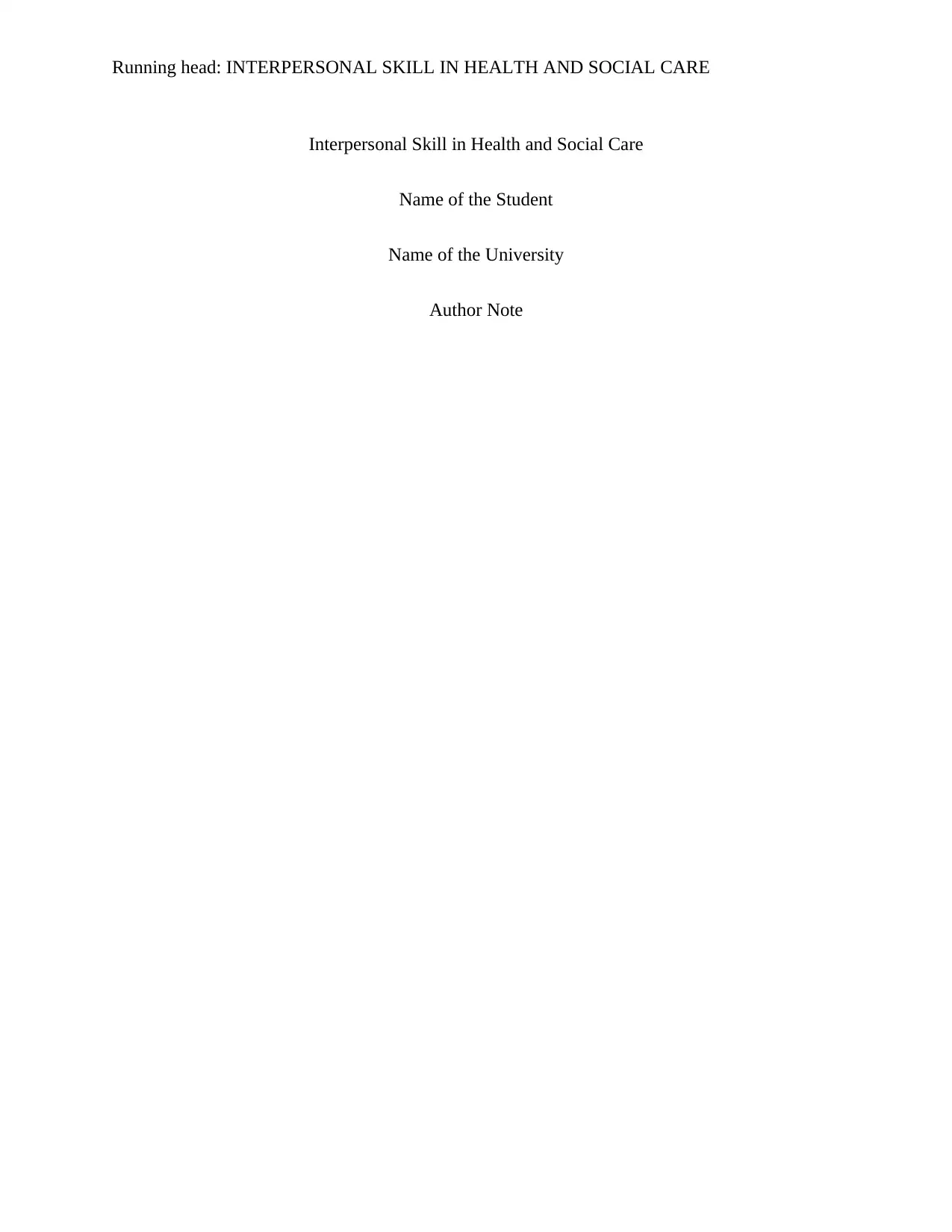
Running head: INTERPERSONAL SKILL IN HEALTH AND SOCIAL CARE
Interpersonal Skill in Health and Social Care
Name of the Student
Name of the University
Author Note
Interpersonal Skill in Health and Social Care
Name of the Student
Name of the University
Author Note
Paraphrase This Document
Need a fresh take? Get an instant paraphrase of this document with our AI Paraphraser
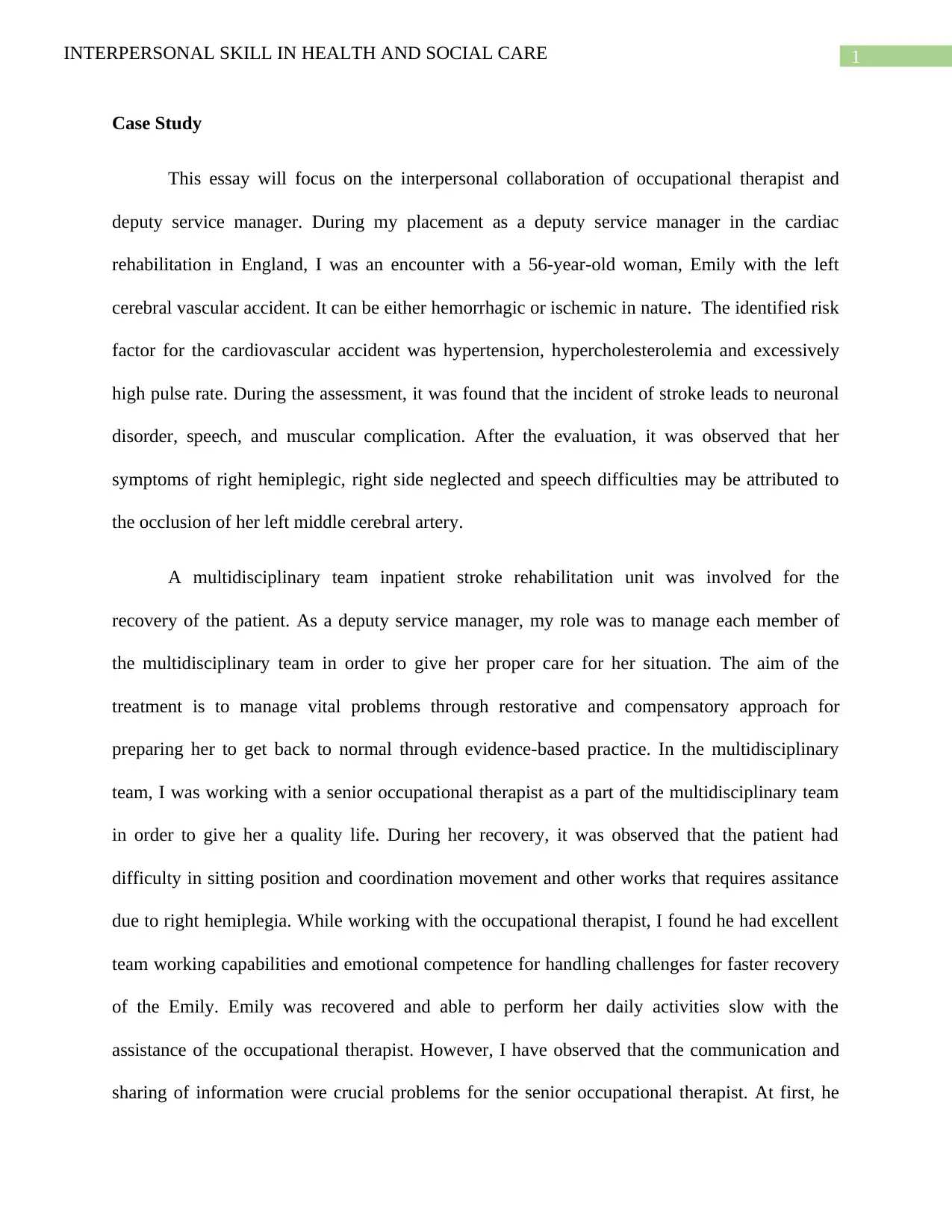
1INTERPERSONAL SKILL IN HEALTH AND SOCIAL CARE
Case Study
This essay will focus on the interpersonal collaboration of occupational therapist and
deputy service manager. During my placement as a deputy service manager in the cardiac
rehabilitation in England, I was an encounter with a 56-year-old woman, Emily with the left
cerebral vascular accident. It can be either hemorrhagic or ischemic in nature. The identified risk
factor for the cardiovascular accident was hypertension, hypercholesterolemia and excessively
high pulse rate. During the assessment, it was found that the incident of stroke leads to neuronal
disorder, speech, and muscular complication. After the evaluation, it was observed that her
symptoms of right hemiplegic, right side neglected and speech difficulties may be attributed to
the occlusion of her left middle cerebral artery.
A multidisciplinary team inpatient stroke rehabilitation unit was involved for the
recovery of the patient. As a deputy service manager, my role was to manage each member of
the multidisciplinary team in order to give her proper care for her situation. The aim of the
treatment is to manage vital problems through restorative and compensatory approach for
preparing her to get back to normal through evidence-based practice. In the multidisciplinary
team, I was working with a senior occupational therapist as a part of the multidisciplinary team
in order to give her a quality life. During her recovery, it was observed that the patient had
difficulty in sitting position and coordination movement and other works that requires assitance
due to right hemiplegia. While working with the occupational therapist, I found he had excellent
team working capabilities and emotional competence for handling challenges for faster recovery
of the Emily. Emily was recovered and able to perform her daily activities slow with the
assistance of the occupational therapist. However, I have observed that the communication and
sharing of information were crucial problems for the senior occupational therapist. At first, he
Case Study
This essay will focus on the interpersonal collaboration of occupational therapist and
deputy service manager. During my placement as a deputy service manager in the cardiac
rehabilitation in England, I was an encounter with a 56-year-old woman, Emily with the left
cerebral vascular accident. It can be either hemorrhagic or ischemic in nature. The identified risk
factor for the cardiovascular accident was hypertension, hypercholesterolemia and excessively
high pulse rate. During the assessment, it was found that the incident of stroke leads to neuronal
disorder, speech, and muscular complication. After the evaluation, it was observed that her
symptoms of right hemiplegic, right side neglected and speech difficulties may be attributed to
the occlusion of her left middle cerebral artery.
A multidisciplinary team inpatient stroke rehabilitation unit was involved for the
recovery of the patient. As a deputy service manager, my role was to manage each member of
the multidisciplinary team in order to give her proper care for her situation. The aim of the
treatment is to manage vital problems through restorative and compensatory approach for
preparing her to get back to normal through evidence-based practice. In the multidisciplinary
team, I was working with a senior occupational therapist as a part of the multidisciplinary team
in order to give her a quality life. During her recovery, it was observed that the patient had
difficulty in sitting position and coordination movement and other works that requires assitance
due to right hemiplegia. While working with the occupational therapist, I found he had excellent
team working capabilities and emotional competence for handling challenges for faster recovery
of the Emily. Emily was recovered and able to perform her daily activities slow with the
assistance of the occupational therapist. However, I have observed that the communication and
sharing of information were crucial problems for the senior occupational therapist. At first, he
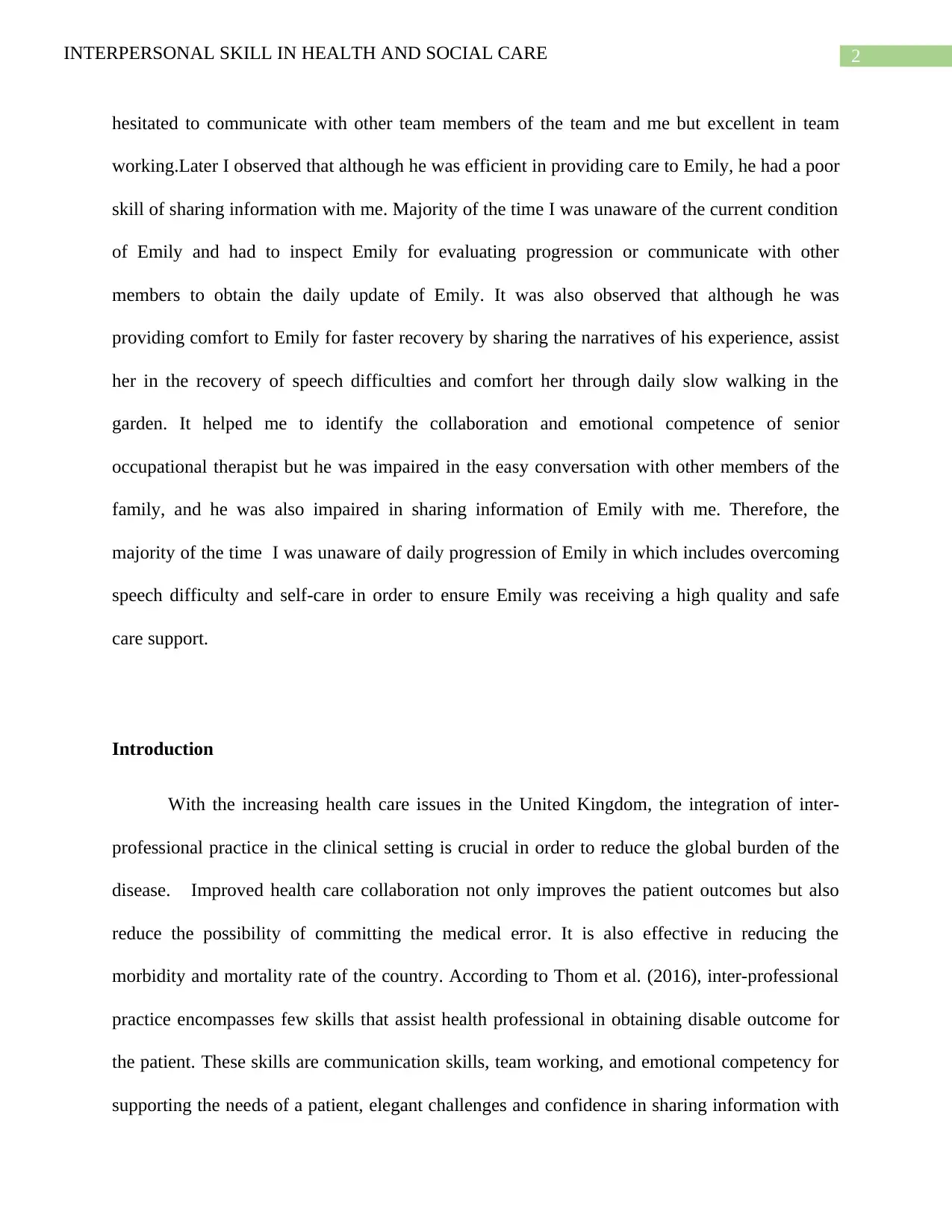
2INTERPERSONAL SKILL IN HEALTH AND SOCIAL CARE
hesitated to communicate with other team members of the team and me but excellent in team
working.Later I observed that although he was efficient in providing care to Emily, he had a poor
skill of sharing information with me. Majority of the time I was unaware of the current condition
of Emily and had to inspect Emily for evaluating progression or communicate with other
members to obtain the daily update of Emily. It was also observed that although he was
providing comfort to Emily for faster recovery by sharing the narratives of his experience, assist
her in the recovery of speech difficulties and comfort her through daily slow walking in the
garden. It helped me to identify the collaboration and emotional competence of senior
occupational therapist but he was impaired in the easy conversation with other members of the
family, and he was also impaired in sharing information of Emily with me. Therefore, the
majority of the time I was unaware of daily progression of Emily in which includes overcoming
speech difficulty and self-care in order to ensure Emily was receiving a high quality and safe
care support.
Introduction
With the increasing health care issues in the United Kingdom, the integration of inter-
professional practice in the clinical setting is crucial in order to reduce the global burden of the
disease. Improved health care collaboration not only improves the patient outcomes but also
reduce the possibility of committing the medical error. It is also effective in reducing the
morbidity and mortality rate of the country. According to Thom et al. (2016), inter-professional
practice encompasses few skills that assist health professional in obtaining disable outcome for
the patient. These skills are communication skills, team working, and emotional competency for
supporting the needs of a patient, elegant challenges and confidence in sharing information with
hesitated to communicate with other team members of the team and me but excellent in team
working.Later I observed that although he was efficient in providing care to Emily, he had a poor
skill of sharing information with me. Majority of the time I was unaware of the current condition
of Emily and had to inspect Emily for evaluating progression or communicate with other
members to obtain the daily update of Emily. It was also observed that although he was
providing comfort to Emily for faster recovery by sharing the narratives of his experience, assist
her in the recovery of speech difficulties and comfort her through daily slow walking in the
garden. It helped me to identify the collaboration and emotional competence of senior
occupational therapist but he was impaired in the easy conversation with other members of the
family, and he was also impaired in sharing information of Emily with me. Therefore, the
majority of the time I was unaware of daily progression of Emily in which includes overcoming
speech difficulty and self-care in order to ensure Emily was receiving a high quality and safe
care support.
Introduction
With the increasing health care issues in the United Kingdom, the integration of inter-
professional practice in the clinical setting is crucial in order to reduce the global burden of the
disease. Improved health care collaboration not only improves the patient outcomes but also
reduce the possibility of committing the medical error. It is also effective in reducing the
morbidity and mortality rate of the country. According to Thom et al. (2016), inter-professional
practice encompasses few skills that assist health professional in obtaining disable outcome for
the patient. These skills are communication skills, team working, and emotional competency for
supporting the needs of a patient, elegant challenges and confidence in sharing information with
⊘ This is a preview!⊘
Do you want full access?
Subscribe today to unlock all pages.

Trusted by 1+ million students worldwide
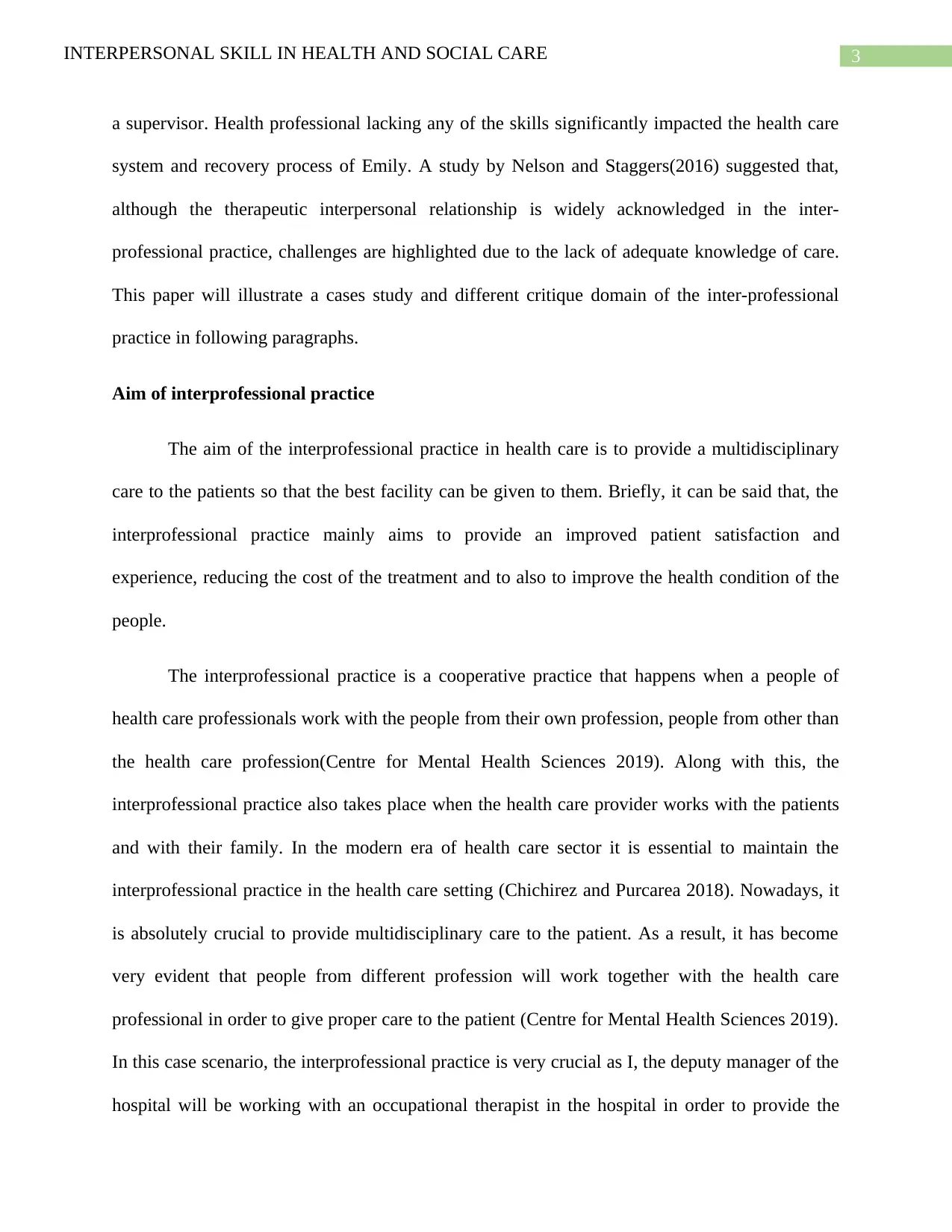
3INTERPERSONAL SKILL IN HEALTH AND SOCIAL CARE
a supervisor. Health professional lacking any of the skills significantly impacted the health care
system and recovery process of Emily. A study by Nelson and Staggers(2016) suggested that,
although the therapeutic interpersonal relationship is widely acknowledged in the inter-
professional practice, challenges are highlighted due to the lack of adequate knowledge of care.
This paper will illustrate a cases study and different critique domain of the inter-professional
practice in following paragraphs.
Aim of interprofessional practice
The aim of the interprofessional practice in health care is to provide a multidisciplinary
care to the patients so that the best facility can be given to them. Briefly, it can be said that, the
interprofessional practice mainly aims to provide an improved patient satisfaction and
experience, reducing the cost of the treatment and to also to improve the health condition of the
people.
The interprofessional practice is a cooperative practice that happens when a people of
health care professionals work with the people from their own profession, people from other than
the health care profession(Centre for Mental Health Sciences 2019). Along with this, the
interprofessional practice also takes place when the health care provider works with the patients
and with their family. In the modern era of health care sector it is essential to maintain the
interprofessional practice in the health care setting (Chichirez and Purcarea 2018). Nowadays, it
is absolutely crucial to provide multidisciplinary care to the patient. As a result, it has become
very evident that people from different profession will work together with the health care
professional in order to give proper care to the patient (Centre for Mental Health Sciences 2019).
In this case scenario, the interprofessional practice is very crucial as I, the deputy manager of the
hospital will be working with an occupational therapist in the hospital in order to provide the
a supervisor. Health professional lacking any of the skills significantly impacted the health care
system and recovery process of Emily. A study by Nelson and Staggers(2016) suggested that,
although the therapeutic interpersonal relationship is widely acknowledged in the inter-
professional practice, challenges are highlighted due to the lack of adequate knowledge of care.
This paper will illustrate a cases study and different critique domain of the inter-professional
practice in following paragraphs.
Aim of interprofessional practice
The aim of the interprofessional practice in health care is to provide a multidisciplinary
care to the patients so that the best facility can be given to them. Briefly, it can be said that, the
interprofessional practice mainly aims to provide an improved patient satisfaction and
experience, reducing the cost of the treatment and to also to improve the health condition of the
people.
The interprofessional practice is a cooperative practice that happens when a people of
health care professionals work with the people from their own profession, people from other than
the health care profession(Centre for Mental Health Sciences 2019). Along with this, the
interprofessional practice also takes place when the health care provider works with the patients
and with their family. In the modern era of health care sector it is essential to maintain the
interprofessional practice in the health care setting (Chichirez and Purcarea 2018). Nowadays, it
is absolutely crucial to provide multidisciplinary care to the patient. As a result, it has become
very evident that people from different profession will work together with the health care
professional in order to give proper care to the patient (Centre for Mental Health Sciences 2019).
In this case scenario, the interprofessional practice is very crucial as I, the deputy manager of the
hospital will be working with an occupational therapist in the hospital in order to provide the
Paraphrase This Document
Need a fresh take? Get an instant paraphrase of this document with our AI Paraphraser
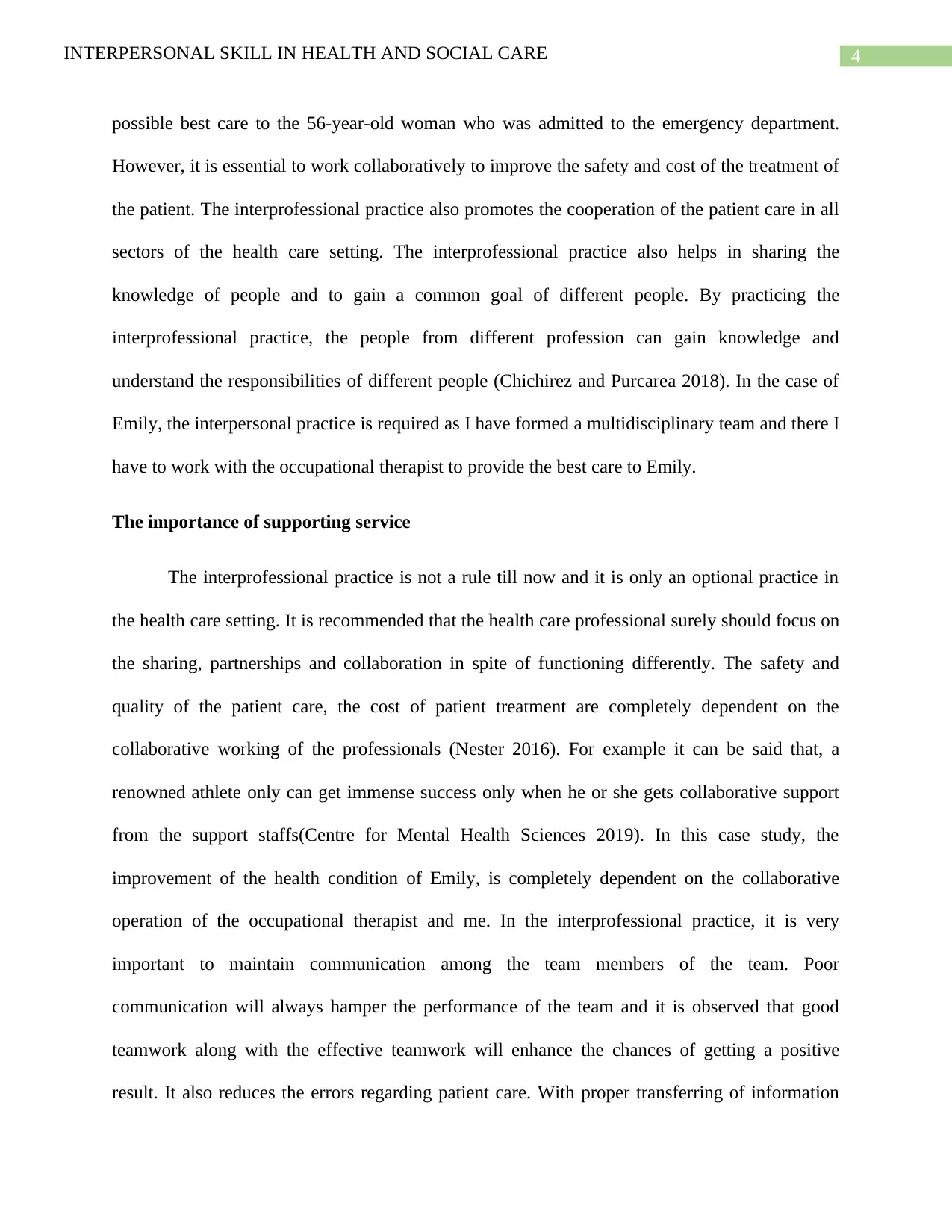
4INTERPERSONAL SKILL IN HEALTH AND SOCIAL CARE
possible best care to the 56-year-old woman who was admitted to the emergency department.
However, it is essential to work collaboratively to improve the safety and cost of the treatment of
the patient. The interprofessional practice also promotes the cooperation of the patient care in all
sectors of the health care setting. The interprofessional practice also helps in sharing the
knowledge of people and to gain a common goal of different people. By practicing the
interprofessional practice, the people from different profession can gain knowledge and
understand the responsibilities of different people (Chichirez and Purcarea 2018). In the case of
Emily, the interpersonal practice is required as I have formed a multidisciplinary team and there I
have to work with the occupational therapist to provide the best care to Emily.
The importance of supporting service
The interprofessional practice is not a rule till now and it is only an optional practice in
the health care setting. It is recommended that the health care professional surely should focus on
the sharing, partnerships and collaboration in spite of functioning differently. The safety and
quality of the patient care, the cost of patient treatment are completely dependent on the
collaborative working of the professionals (Nester 2016). For example it can be said that, a
renowned athlete only can get immense success only when he or she gets collaborative support
from the support staffs(Centre for Mental Health Sciences 2019). In this case study, the
improvement of the health condition of Emily, is completely dependent on the collaborative
operation of the occupational therapist and me. In the interprofessional practice, it is very
important to maintain communication among the team members of the team. Poor
communication will always hamper the performance of the team and it is observed that good
teamwork along with the effective teamwork will enhance the chances of getting a positive
result. It also reduces the errors regarding patient care. With proper transferring of information
possible best care to the 56-year-old woman who was admitted to the emergency department.
However, it is essential to work collaboratively to improve the safety and cost of the treatment of
the patient. The interprofessional practice also promotes the cooperation of the patient care in all
sectors of the health care setting. The interprofessional practice also helps in sharing the
knowledge of people and to gain a common goal of different people. By practicing the
interprofessional practice, the people from different profession can gain knowledge and
understand the responsibilities of different people (Chichirez and Purcarea 2018). In the case of
Emily, the interpersonal practice is required as I have formed a multidisciplinary team and there I
have to work with the occupational therapist to provide the best care to Emily.
The importance of supporting service
The interprofessional practice is not a rule till now and it is only an optional practice in
the health care setting. It is recommended that the health care professional surely should focus on
the sharing, partnerships and collaboration in spite of functioning differently. The safety and
quality of the patient care, the cost of patient treatment are completely dependent on the
collaborative working of the professionals (Nester 2016). For example it can be said that, a
renowned athlete only can get immense success only when he or she gets collaborative support
from the support staffs(Centre for Mental Health Sciences 2019). In this case study, the
improvement of the health condition of Emily, is completely dependent on the collaborative
operation of the occupational therapist and me. In the interprofessional practice, it is very
important to maintain communication among the team members of the team. Poor
communication will always hamper the performance of the team and it is observed that good
teamwork along with the effective teamwork will enhance the chances of getting a positive
result. It also reduces the errors regarding patient care. With proper transferring of information
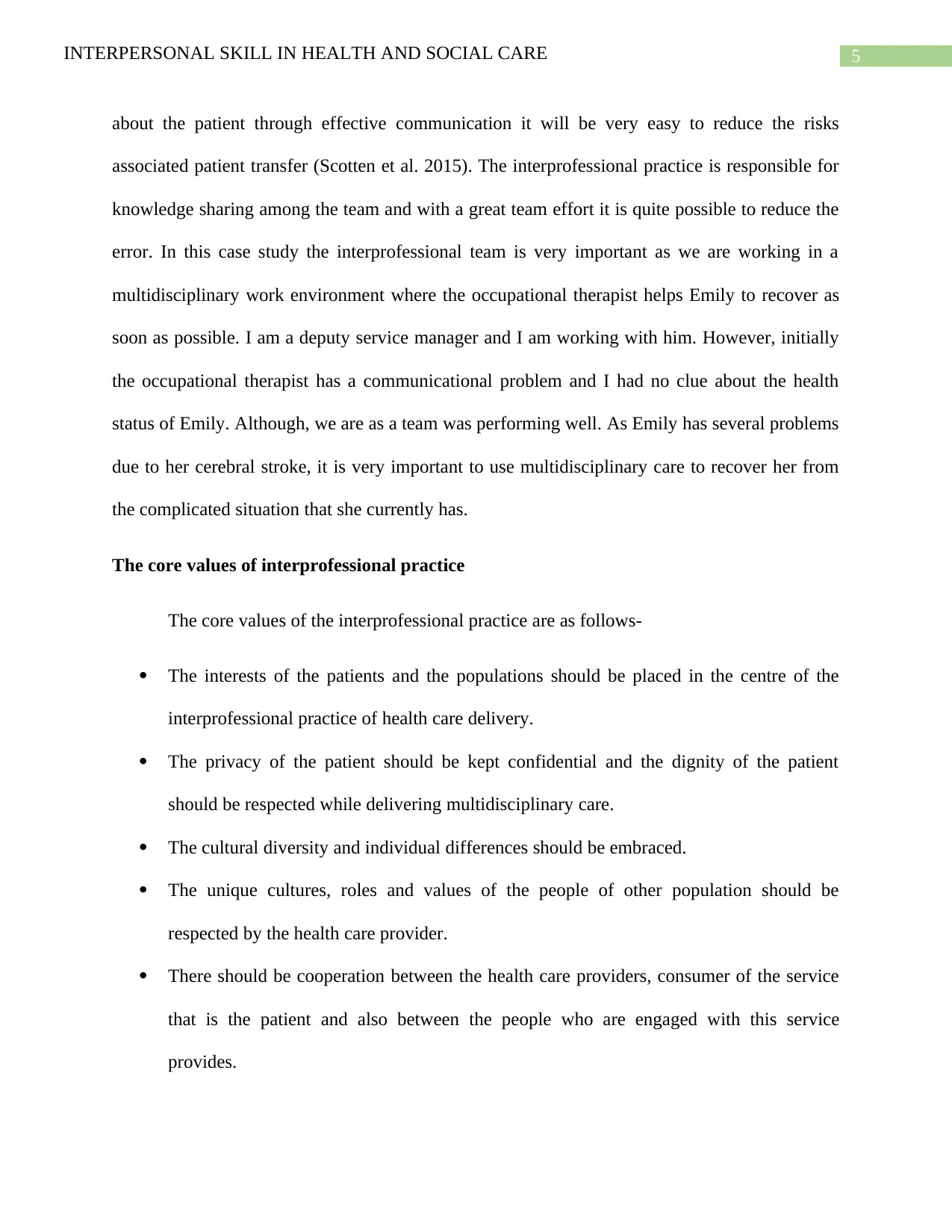
5INTERPERSONAL SKILL IN HEALTH AND SOCIAL CARE
about the patient through effective communication it will be very easy to reduce the risks
associated patient transfer (Scotten et al. 2015). The interprofessional practice is responsible for
knowledge sharing among the team and with a great team effort it is quite possible to reduce the
error. In this case study the interprofessional team is very important as we are working in a
multidisciplinary work environment where the occupational therapist helps Emily to recover as
soon as possible. I am a deputy service manager and I am working with him. However, initially
the occupational therapist has a communicational problem and I had no clue about the health
status of Emily. Although, we are as a team was performing well. As Emily has several problems
due to her cerebral stroke, it is very important to use multidisciplinary care to recover her from
the complicated situation that she currently has.
The core values of interprofessional practice
The core values of the interprofessional practice are as follows-
The interests of the patients and the populations should be placed in the centre of the
interprofessional practice of health care delivery.
The privacy of the patient should be kept confidential and the dignity of the patient
should be respected while delivering multidisciplinary care.
The cultural diversity and individual differences should be embraced.
The unique cultures, roles and values of the people of other population should be
respected by the health care provider.
There should be cooperation between the health care providers, consumer of the service
that is the patient and also between the people who are engaged with this service
provides.
about the patient through effective communication it will be very easy to reduce the risks
associated patient transfer (Scotten et al. 2015). The interprofessional practice is responsible for
knowledge sharing among the team and with a great team effort it is quite possible to reduce the
error. In this case study the interprofessional team is very important as we are working in a
multidisciplinary work environment where the occupational therapist helps Emily to recover as
soon as possible. I am a deputy service manager and I am working with him. However, initially
the occupational therapist has a communicational problem and I had no clue about the health
status of Emily. Although, we are as a team was performing well. As Emily has several problems
due to her cerebral stroke, it is very important to use multidisciplinary care to recover her from
the complicated situation that she currently has.
The core values of interprofessional practice
The core values of the interprofessional practice are as follows-
The interests of the patients and the populations should be placed in the centre of the
interprofessional practice of health care delivery.
The privacy of the patient should be kept confidential and the dignity of the patient
should be respected while delivering multidisciplinary care.
The cultural diversity and individual differences should be embraced.
The unique cultures, roles and values of the people of other population should be
respected by the health care provider.
There should be cooperation between the health care providers, consumer of the service
that is the patient and also between the people who are engaged with this service
provides.
⊘ This is a preview!⊘
Do you want full access?
Subscribe today to unlock all pages.

Trusted by 1+ million students worldwide
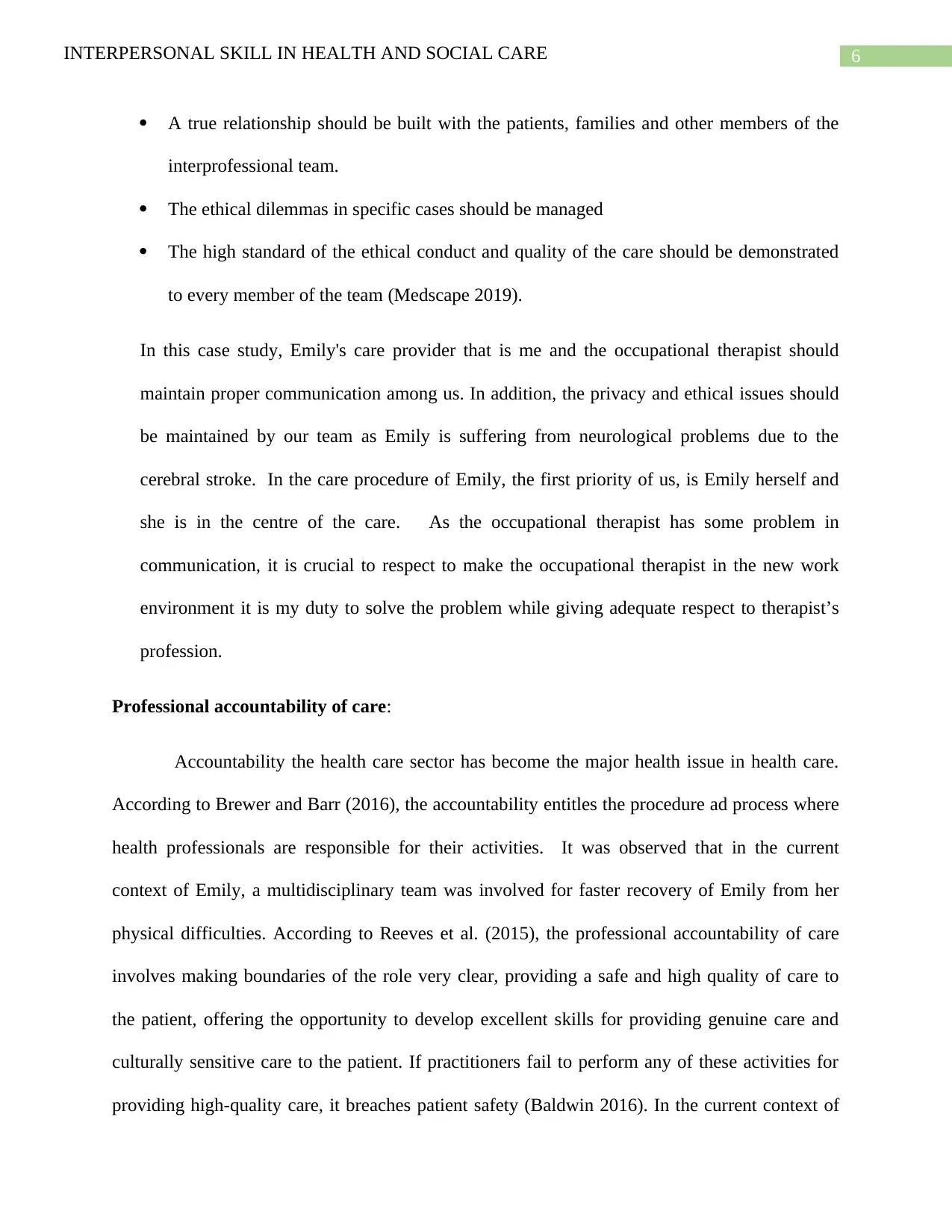
6INTERPERSONAL SKILL IN HEALTH AND SOCIAL CARE
A true relationship should be built with the patients, families and other members of the
interprofessional team.
The ethical dilemmas in specific cases should be managed
The high standard of the ethical conduct and quality of the care should be demonstrated
to every member of the team (Medscape 2019).
In this case study, Emily's care provider that is me and the occupational therapist should
maintain proper communication among us. In addition, the privacy and ethical issues should
be maintained by our team as Emily is suffering from neurological problems due to the
cerebral stroke. In the care procedure of Emily, the first priority of us, is Emily herself and
she is in the centre of the care. As the occupational therapist has some problem in
communication, it is crucial to respect to make the occupational therapist in the new work
environment it is my duty to solve the problem while giving adequate respect to therapist’s
profession.
Professional accountability of care:
Accountability the health care sector has become the major health issue in health care.
According to Brewer and Barr (2016), the accountability entitles the procedure ad process where
health professionals are responsible for their activities. It was observed that in the current
context of Emily, a multidisciplinary team was involved for faster recovery of Emily from her
physical difficulties. According to Reeves et al. (2015), the professional accountability of care
involves making boundaries of the role very clear, providing a safe and high quality of care to
the patient, offering the opportunity to develop excellent skills for providing genuine care and
culturally sensitive care to the patient. If practitioners fail to perform any of these activities for
providing high-quality care, it breaches patient safety (Baldwin 2016). In the current context of
A true relationship should be built with the patients, families and other members of the
interprofessional team.
The ethical dilemmas in specific cases should be managed
The high standard of the ethical conduct and quality of the care should be demonstrated
to every member of the team (Medscape 2019).
In this case study, Emily's care provider that is me and the occupational therapist should
maintain proper communication among us. In addition, the privacy and ethical issues should
be maintained by our team as Emily is suffering from neurological problems due to the
cerebral stroke. In the care procedure of Emily, the first priority of us, is Emily herself and
she is in the centre of the care. As the occupational therapist has some problem in
communication, it is crucial to respect to make the occupational therapist in the new work
environment it is my duty to solve the problem while giving adequate respect to therapist’s
profession.
Professional accountability of care:
Accountability the health care sector has become the major health issue in health care.
According to Brewer and Barr (2016), the accountability entitles the procedure ad process where
health professionals are responsible for their activities. It was observed that in the current
context of Emily, a multidisciplinary team was involved for faster recovery of Emily from her
physical difficulties. According to Reeves et al. (2015), the professional accountability of care
involves making boundaries of the role very clear, providing a safe and high quality of care to
the patient, offering the opportunity to develop excellent skills for providing genuine care and
culturally sensitive care to the patient. If practitioners fail to perform any of these activities for
providing high-quality care, it breaches patient safety (Baldwin 2016). In the current context of
Paraphrase This Document
Need a fresh take? Get an instant paraphrase of this document with our AI Paraphraser
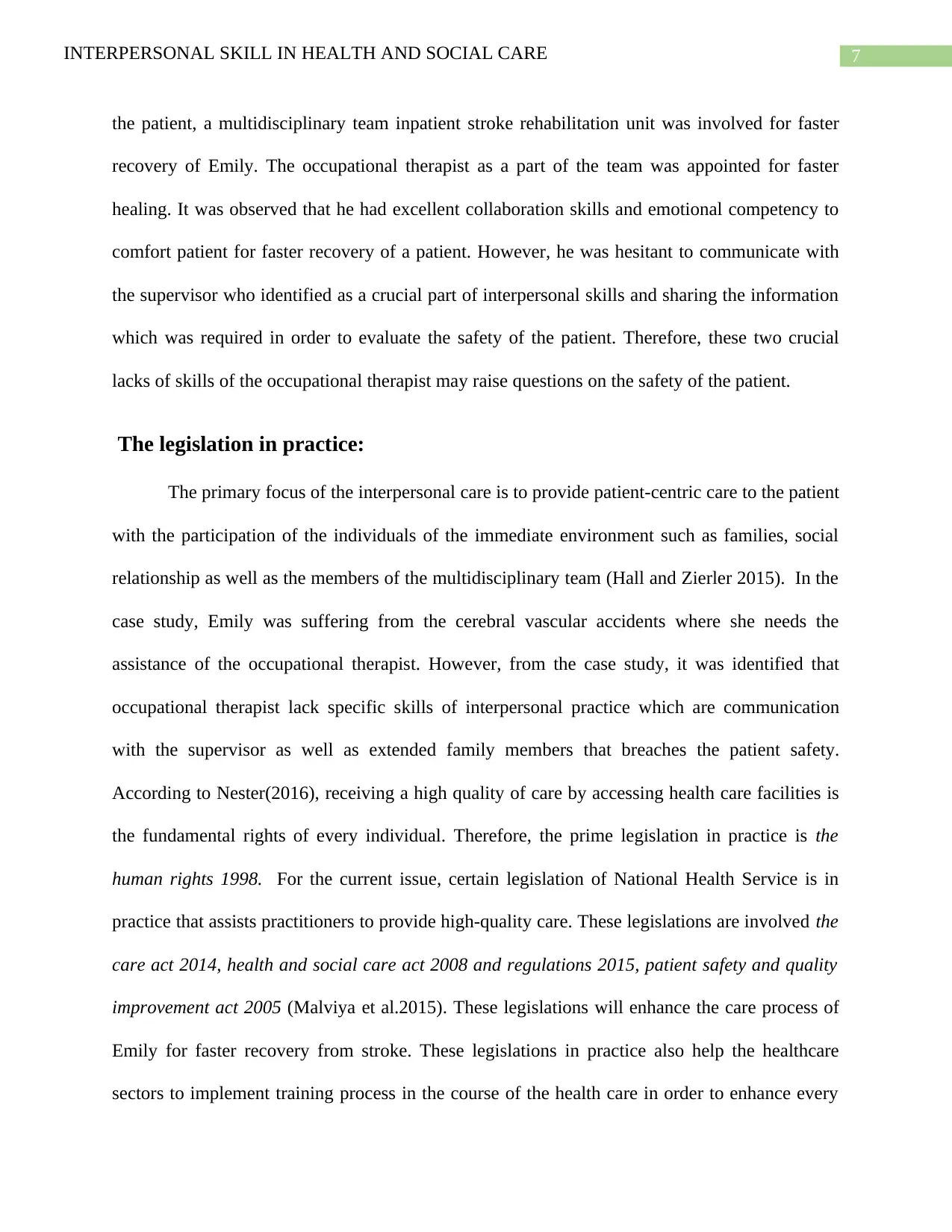
7INTERPERSONAL SKILL IN HEALTH AND SOCIAL CARE
the patient, a multidisciplinary team inpatient stroke rehabilitation unit was involved for faster
recovery of Emily. The occupational therapist as a part of the team was appointed for faster
healing. It was observed that he had excellent collaboration skills and emotional competency to
comfort patient for faster recovery of a patient. However, he was hesitant to communicate with
the supervisor who identified as a crucial part of interpersonal skills and sharing the information
which was required in order to evaluate the safety of the patient. Therefore, these two crucial
lacks of skills of the occupational therapist may raise questions on the safety of the patient.
The legislation in practice:
The primary focus of the interpersonal care is to provide patient-centric care to the patient
with the participation of the individuals of the immediate environment such as families, social
relationship as well as the members of the multidisciplinary team (Hall and Zierler 2015). In the
case study, Emily was suffering from the cerebral vascular accidents where she needs the
assistance of the occupational therapist. However, from the case study, it was identified that
occupational therapist lack specific skills of interpersonal practice which are communication
with the supervisor as well as extended family members that breaches the patient safety.
According to Nester(2016), receiving a high quality of care by accessing health care facilities is
the fundamental rights of every individual. Therefore, the prime legislation in practice is the
human rights 1998. For the current issue, certain legislation of National Health Service is in
practice that assists practitioners to provide high-quality care. These legislations are involved the
care act 2014, health and social care act 2008 and regulations 2015, patient safety and quality
improvement act 2005 (Malviya et al.2015). These legislations will enhance the care process of
Emily for faster recovery from stroke. These legislations in practice also help the healthcare
sectors to implement training process in the course of the health care in order to enhance every
the patient, a multidisciplinary team inpatient stroke rehabilitation unit was involved for faster
recovery of Emily. The occupational therapist as a part of the team was appointed for faster
healing. It was observed that he had excellent collaboration skills and emotional competency to
comfort patient for faster recovery of a patient. However, he was hesitant to communicate with
the supervisor who identified as a crucial part of interpersonal skills and sharing the information
which was required in order to evaluate the safety of the patient. Therefore, these two crucial
lacks of skills of the occupational therapist may raise questions on the safety of the patient.
The legislation in practice:
The primary focus of the interpersonal care is to provide patient-centric care to the patient
with the participation of the individuals of the immediate environment such as families, social
relationship as well as the members of the multidisciplinary team (Hall and Zierler 2015). In the
case study, Emily was suffering from the cerebral vascular accidents where she needs the
assistance of the occupational therapist. However, from the case study, it was identified that
occupational therapist lack specific skills of interpersonal practice which are communication
with the supervisor as well as extended family members that breaches the patient safety.
According to Nester(2016), receiving a high quality of care by accessing health care facilities is
the fundamental rights of every individual. Therefore, the prime legislation in practice is the
human rights 1998. For the current issue, certain legislation of National Health Service is in
practice that assists practitioners to provide high-quality care. These legislations are involved the
care act 2014, health and social care act 2008 and regulations 2015, patient safety and quality
improvement act 2005 (Malviya et al.2015). These legislations will enhance the care process of
Emily for faster recovery from stroke. These legislations in practice also help the healthcare
sectors to implement training process in the course of the health care in order to enhance every
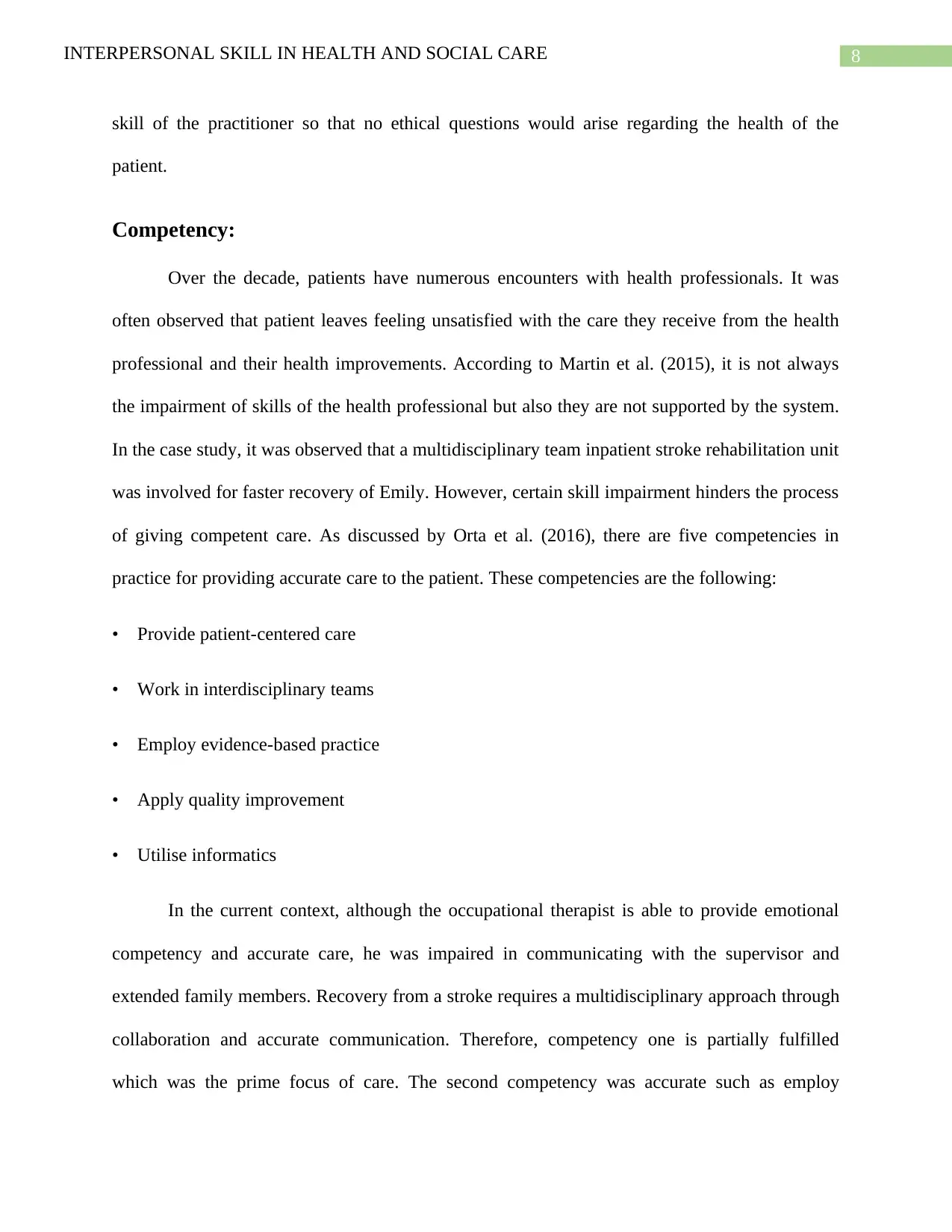
8INTERPERSONAL SKILL IN HEALTH AND SOCIAL CARE
skill of the practitioner so that no ethical questions would arise regarding the health of the
patient.
Competency:
Over the decade, patients have numerous encounters with health professionals. It was
often observed that patient leaves feeling unsatisfied with the care they receive from the health
professional and their health improvements. According to Martin et al. (2015), it is not always
the impairment of skills of the health professional but also they are not supported by the system.
In the case study, it was observed that a multidisciplinary team inpatient stroke rehabilitation unit
was involved for faster recovery of Emily. However, certain skill impairment hinders the process
of giving competent care. As discussed by Orta et al. (2016), there are five competencies in
practice for providing accurate care to the patient. These competencies are the following:
• Provide patient-centered care
• Work in interdisciplinary teams
• Employ evidence-based practice
• Apply quality improvement
• Utilise informatics
In the current context, although the occupational therapist is able to provide emotional
competency and accurate care, he was impaired in communicating with the supervisor and
extended family members. Recovery from a stroke requires a multidisciplinary approach through
collaboration and accurate communication. Therefore, competency one is partially fulfilled
which was the prime focus of care. The second competency was accurate such as employ
skill of the practitioner so that no ethical questions would arise regarding the health of the
patient.
Competency:
Over the decade, patients have numerous encounters with health professionals. It was
often observed that patient leaves feeling unsatisfied with the care they receive from the health
professional and their health improvements. According to Martin et al. (2015), it is not always
the impairment of skills of the health professional but also they are not supported by the system.
In the case study, it was observed that a multidisciplinary team inpatient stroke rehabilitation unit
was involved for faster recovery of Emily. However, certain skill impairment hinders the process
of giving competent care. As discussed by Orta et al. (2016), there are five competencies in
practice for providing accurate care to the patient. These competencies are the following:
• Provide patient-centered care
• Work in interdisciplinary teams
• Employ evidence-based practice
• Apply quality improvement
• Utilise informatics
In the current context, although the occupational therapist is able to provide emotional
competency and accurate care, he was impaired in communicating with the supervisor and
extended family members. Recovery from a stroke requires a multidisciplinary approach through
collaboration and accurate communication. Therefore, competency one is partially fulfilled
which was the prime focus of care. The second competency was accurate such as employ
⊘ This is a preview!⊘
Do you want full access?
Subscribe today to unlock all pages.

Trusted by 1+ million students worldwide
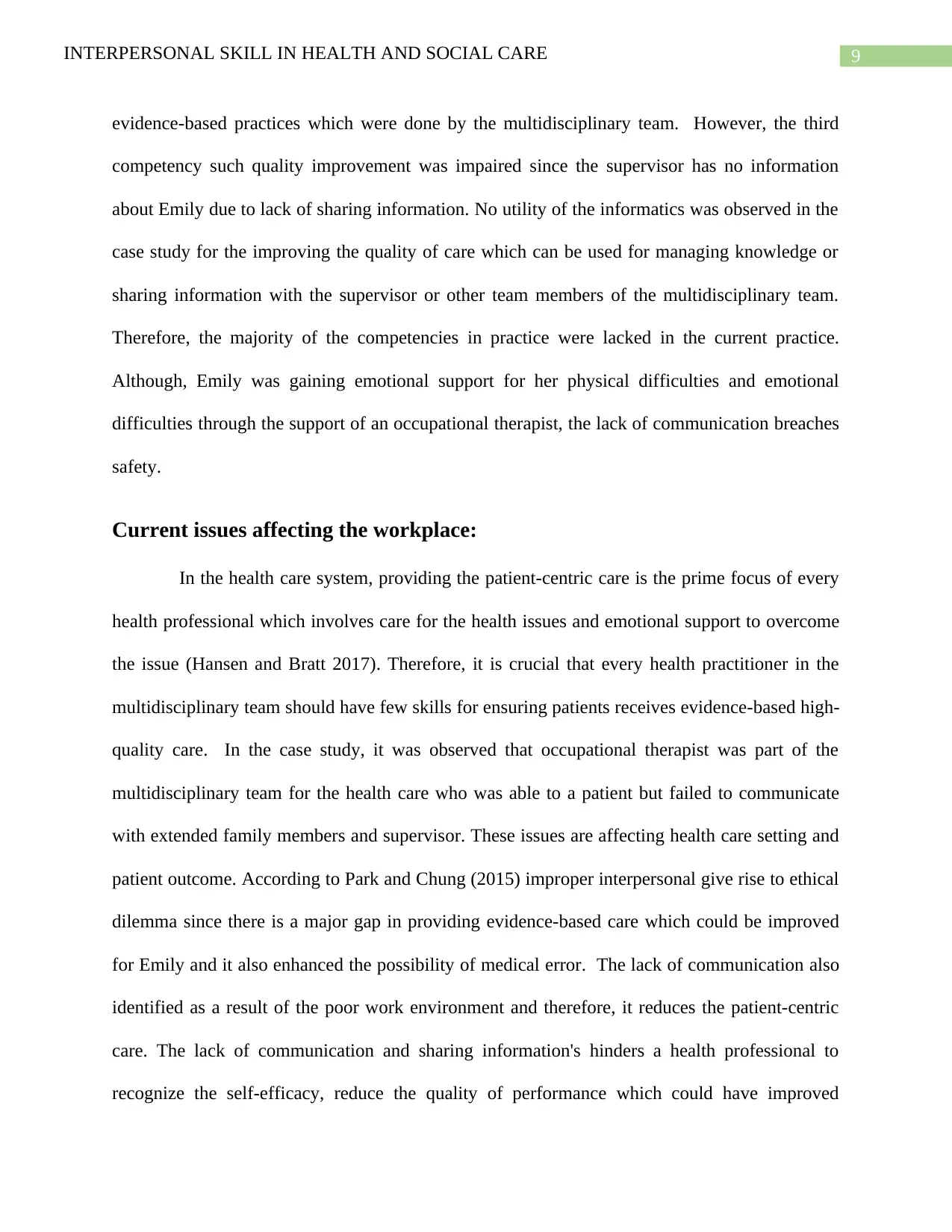
9INTERPERSONAL SKILL IN HEALTH AND SOCIAL CARE
evidence-based practices which were done by the multidisciplinary team. However, the third
competency such quality improvement was impaired since the supervisor has no information
about Emily due to lack of sharing information. No utility of the informatics was observed in the
case study for the improving the quality of care which can be used for managing knowledge or
sharing information with the supervisor or other team members of the multidisciplinary team.
Therefore, the majority of the competencies in practice were lacked in the current practice.
Although, Emily was gaining emotional support for her physical difficulties and emotional
difficulties through the support of an occupational therapist, the lack of communication breaches
safety.
Current issues affecting the workplace:
In the health care system, providing the patient-centric care is the prime focus of every
health professional which involves care for the health issues and emotional support to overcome
the issue (Hansen and Bratt 2017). Therefore, it is crucial that every health practitioner in the
multidisciplinary team should have few skills for ensuring patients receives evidence-based high-
quality care. In the case study, it was observed that occupational therapist was part of the
multidisciplinary team for the health care who was able to a patient but failed to communicate
with extended family members and supervisor. These issues are affecting health care setting and
patient outcome. According to Park and Chung (2015) improper interpersonal give rise to ethical
dilemma since there is a major gap in providing evidence-based care which could be improved
for Emily and it also enhanced the possibility of medical error. The lack of communication also
identified as a result of the poor work environment and therefore, it reduces the patient-centric
care. The lack of communication and sharing information's hinders a health professional to
recognize the self-efficacy, reduce the quality of performance which could have improved
evidence-based practices which were done by the multidisciplinary team. However, the third
competency such quality improvement was impaired since the supervisor has no information
about Emily due to lack of sharing information. No utility of the informatics was observed in the
case study for the improving the quality of care which can be used for managing knowledge or
sharing information with the supervisor or other team members of the multidisciplinary team.
Therefore, the majority of the competencies in practice were lacked in the current practice.
Although, Emily was gaining emotional support for her physical difficulties and emotional
difficulties through the support of an occupational therapist, the lack of communication breaches
safety.
Current issues affecting the workplace:
In the health care system, providing the patient-centric care is the prime focus of every
health professional which involves care for the health issues and emotional support to overcome
the issue (Hansen and Bratt 2017). Therefore, it is crucial that every health practitioner in the
multidisciplinary team should have few skills for ensuring patients receives evidence-based high-
quality care. In the case study, it was observed that occupational therapist was part of the
multidisciplinary team for the health care who was able to a patient but failed to communicate
with extended family members and supervisor. These issues are affecting health care setting and
patient outcome. According to Park and Chung (2015) improper interpersonal give rise to ethical
dilemma since there is a major gap in providing evidence-based care which could be improved
for Emily and it also enhanced the possibility of medical error. The lack of communication also
identified as a result of the poor work environment and therefore, it reduces the patient-centric
care. The lack of communication and sharing information's hinders a health professional to
recognize the self-efficacy, reduce the quality of performance which could have improved
Paraphrase This Document
Need a fresh take? Get an instant paraphrase of this document with our AI Paraphraser
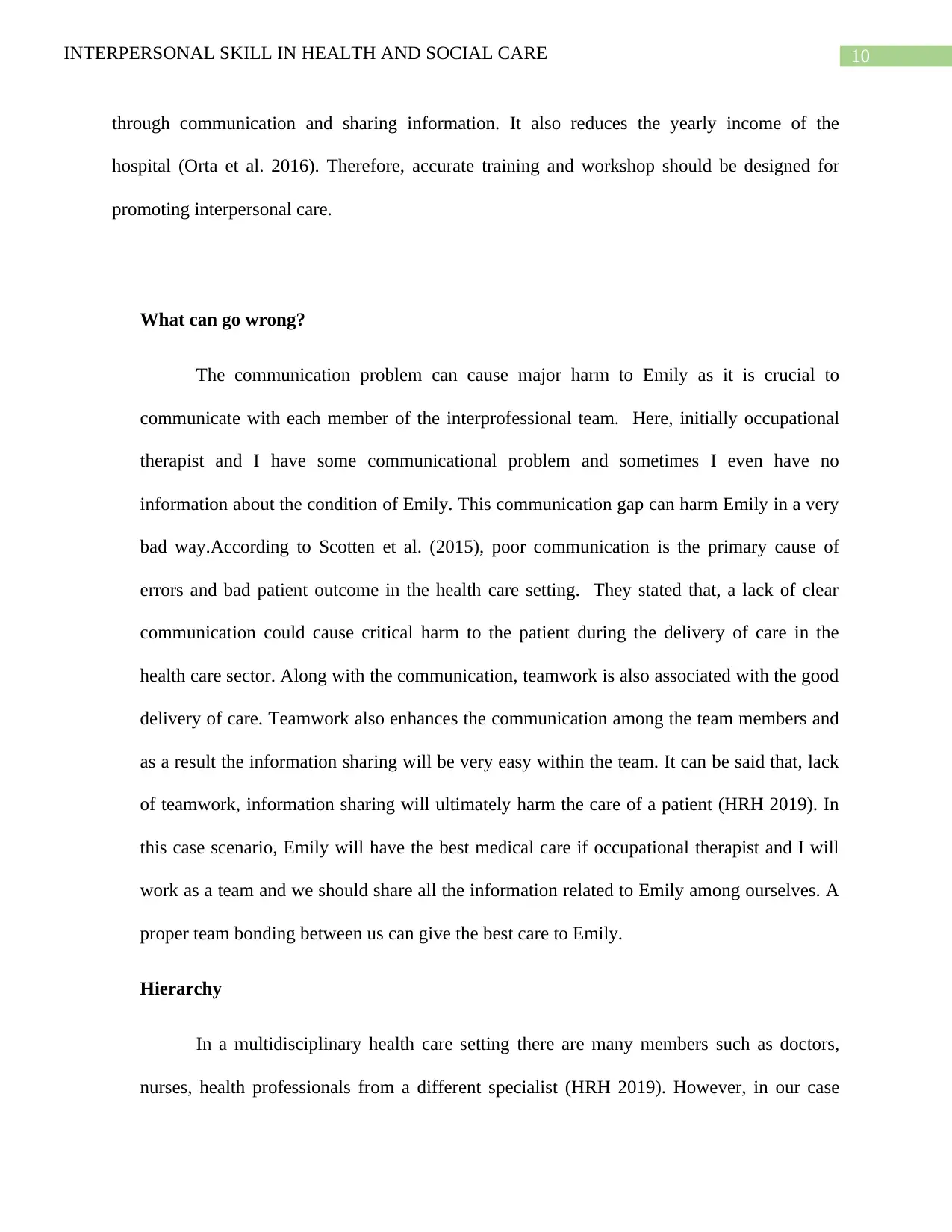
10INTERPERSONAL SKILL IN HEALTH AND SOCIAL CARE
through communication and sharing information. It also reduces the yearly income of the
hospital (Orta et al. 2016). Therefore, accurate training and workshop should be designed for
promoting interpersonal care.
What can go wrong?
The communication problem can cause major harm to Emily as it is crucial to
communicate with each member of the interprofessional team. Here, initially occupational
therapist and I have some communicational problem and sometimes I even have no
information about the condition of Emily. This communication gap can harm Emily in a very
bad way.According to Scotten et al. (2015), poor communication is the primary cause of
errors and bad patient outcome in the health care setting. They stated that, a lack of clear
communication could cause critical harm to the patient during the delivery of care in the
health care sector. Along with the communication, teamwork is also associated with the good
delivery of care. Teamwork also enhances the communication among the team members and
as a result the information sharing will be very easy within the team. It can be said that, lack
of teamwork, information sharing will ultimately harm the care of a patient (HRH 2019). In
this case scenario, Emily will have the best medical care if occupational therapist and I will
work as a team and we should share all the information related to Emily among ourselves. A
proper team bonding between us can give the best care to Emily.
Hierarchy
In a multidisciplinary health care setting there are many members such as doctors,
nurses, health professionals from a different specialist (HRH 2019). However, in our case
through communication and sharing information. It also reduces the yearly income of the
hospital (Orta et al. 2016). Therefore, accurate training and workshop should be designed for
promoting interpersonal care.
What can go wrong?
The communication problem can cause major harm to Emily as it is crucial to
communicate with each member of the interprofessional team. Here, initially occupational
therapist and I have some communicational problem and sometimes I even have no
information about the condition of Emily. This communication gap can harm Emily in a very
bad way.According to Scotten et al. (2015), poor communication is the primary cause of
errors and bad patient outcome in the health care setting. They stated that, a lack of clear
communication could cause critical harm to the patient during the delivery of care in the
health care sector. Along with the communication, teamwork is also associated with the good
delivery of care. Teamwork also enhances the communication among the team members and
as a result the information sharing will be very easy within the team. It can be said that, lack
of teamwork, information sharing will ultimately harm the care of a patient (HRH 2019). In
this case scenario, Emily will have the best medical care if occupational therapist and I will
work as a team and we should share all the information related to Emily among ourselves. A
proper team bonding between us can give the best care to Emily.
Hierarchy
In a multidisciplinary health care setting there are many members such as doctors,
nurses, health professionals from a different specialist (HRH 2019). However, in our case
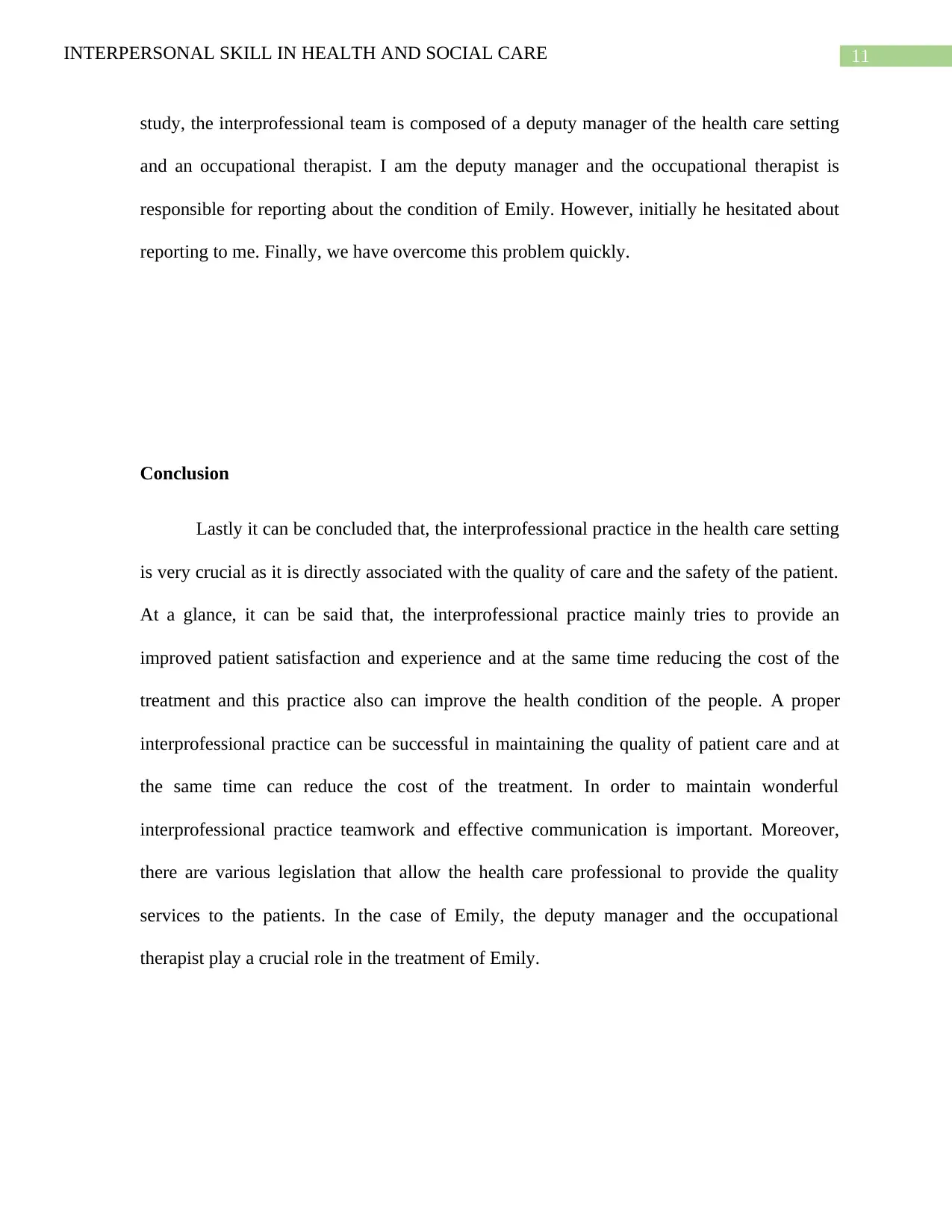
11INTERPERSONAL SKILL IN HEALTH AND SOCIAL CARE
study, the interprofessional team is composed of a deputy manager of the health care setting
and an occupational therapist. I am the deputy manager and the occupational therapist is
responsible for reporting about the condition of Emily. However, initially he hesitated about
reporting to me. Finally, we have overcome this problem quickly.
Conclusion
Lastly it can be concluded that, the interprofessional practice in the health care setting
is very crucial as it is directly associated with the quality of care and the safety of the patient.
At a glance, it can be said that, the interprofessional practice mainly tries to provide an
improved patient satisfaction and experience and at the same time reducing the cost of the
treatment and this practice also can improve the health condition of the people. A proper
interprofessional practice can be successful in maintaining the quality of patient care and at
the same time can reduce the cost of the treatment. In order to maintain wonderful
interprofessional practice teamwork and effective communication is important. Moreover,
there are various legislation that allow the health care professional to provide the quality
services to the patients. In the case of Emily, the deputy manager and the occupational
therapist play a crucial role in the treatment of Emily.
study, the interprofessional team is composed of a deputy manager of the health care setting
and an occupational therapist. I am the deputy manager and the occupational therapist is
responsible for reporting about the condition of Emily. However, initially he hesitated about
reporting to me. Finally, we have overcome this problem quickly.
Conclusion
Lastly it can be concluded that, the interprofessional practice in the health care setting
is very crucial as it is directly associated with the quality of care and the safety of the patient.
At a glance, it can be said that, the interprofessional practice mainly tries to provide an
improved patient satisfaction and experience and at the same time reducing the cost of the
treatment and this practice also can improve the health condition of the people. A proper
interprofessional practice can be successful in maintaining the quality of patient care and at
the same time can reduce the cost of the treatment. In order to maintain wonderful
interprofessional practice teamwork and effective communication is important. Moreover,
there are various legislation that allow the health care professional to provide the quality
services to the patients. In the case of Emily, the deputy manager and the occupational
therapist play a crucial role in the treatment of Emily.
⊘ This is a preview!⊘
Do you want full access?
Subscribe today to unlock all pages.

Trusted by 1+ million students worldwide
1 out of 15
Related Documents
Your All-in-One AI-Powered Toolkit for Academic Success.
+13062052269
info@desklib.com
Available 24*7 on WhatsApp / Email
![[object Object]](/_next/static/media/star-bottom.7253800d.svg)
Unlock your academic potential
Copyright © 2020–2026 A2Z Services. All Rights Reserved. Developed and managed by ZUCOL.





